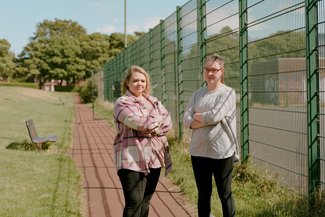
Young Women's Justice Project
Engaging with young women, front-line staff and other experts to build an evidence base about the needs of girls and young women in contact with the criminal justice system.

9 May 2024
Today (9 May 2024) the Ministry of Justice (MoJ) published its ‘One Year on’ progress report against the Female Offenders Strategy. We welcome this transparent and public update.
Women and girls in touch with the criminal justice system often have long histories of multiple unmet needs, including experiences of trauma and abuse, having no safe place to call home, untreated mental health issues and using substances to cope – needs which often drive their criminalisation. Women and girls urgently need gender-, age-, trauma- and culturally-responsive support, delivered in the community, to divert them from lifelong cycles of harm. While there has clearly been focused work in this space, much of which we welcome, we are concerned about some key omissions.
We welcome the pause on plans to build 500 new prison places across the women’s estate. Building more prison places directly undermines the aim to reduce the overall female prison population. Given the acknowledgement within this update of the astronomically high cost of such building projects, the MoJ should reconsider these plans entirely and work with the sector to consider how this funding could be repurposed. However, no firm proposals for delivering alternative gender and trauma-informed approaches have been set out. Government should focus on creating conditions in which women and girls can be diverted from prison once and for all. Investing further in community services, such as women’s centres, and developing meaningful partnerships with the specialist women and girls’ sector is essential to delivering holistic alternatives to custody .
While the progress report references two pilots aiming to address the needs of young women, we are concerned and disappointed that it makes no reference to the Young Women’s Strategy – promised since 2021. A cross-cutting, strategic approach for young women is vital to ensure the challenges they face across education, mental health, in facing abuse, violence and exploitation and transitioning between youth and adult services must be addressed. The needs of care leavers, and Black and minoritised girls, must be centred and specifically addressed.
Through our Young Women’s Justice Project, we have advocated consistently for a Young Women’s Strategy which is shaped in partnership with young women and the specialist sector which supports them, to ensure it meets their needs. and have welcomed previous news on its progress. However, this progress report misses an opportunity to make a public commitment to delivering this vital work, leaving us concerned that young women’s needs will once again be overlooked.
We know that the criminal justice system is facing immense pressure, but we urge policymakers to consider the long-term positive impacts of acting now to prevent women and girls entering the system. Reinvesting limited public funds in this crucial work will reduce costs to the criminal justice system, and lead to long term benefits to society, public services, and women and girls in the future.
We look forward to continue engaging with the Ministry of Justice in the coming weeks and months to move forward in these areas, and as ever welcome opportunities to explore how better support systems can be established in partnership with the specialist women and girls sector. Only by embedding meaningful partnership working can we ensure that the support on offer responds to the specific needs of women and girls who have been criminalised.

Engaging with young women, front-line staff and other experts to build an evidence base about the needs of girls and young women in contact with the criminal justice system.

A new briefing paper published today by Agenda Alliance and Alliance for Youth Justice (AYJ) reveals the severe mental health problems facing young women in our prisons.